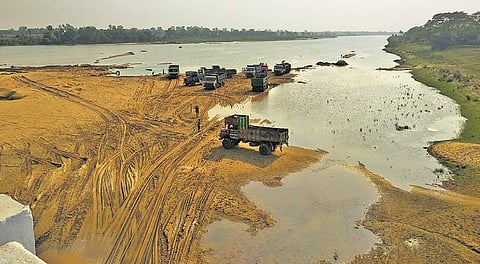

THOOTHUKUDI: Against the backdrop of the Water Resources Department's recent agreement to sell the sand in connection with the Thamirabarani-Karumeniaru-Nambiyaru river interlinking project to the public-sector unit IREL (India) Limited at a cost of Rs 15 crore, activists have urged the authorities to sell the sand minerals excavated from the tanks in the river beds and coastal plains also to the IREL.
They opine that more agreements with the public-sector unit will curb illegal mining of sand and rein in the sand mafia. The coastal plains and river beds in Thoothukudi, Tirunelveli and Kanniyakumari districts are renowned for sand that holds heavy composition of atomic minerals.
It is said that the minerals got deposited here after flowing down the Podhigai Hills of Western Ghats a long time ago. The coastal plains contain mineral deposits to an extent of up to 9 km onshore.
Furthermore, parts of Thoothukudi district are endowed with 'teri landscape' (also known as red sand desert), which is a typical sedimentary aeolian deposit containing iron-stained quartz, feldspar, and a significant quantity of heavy minerals.
Teri landscape sand possesses atomic minerals like ilmenite, rutile, leucoxene, zircon, garnet, monazite and sillimanite.
As per the district administration's approval to remove silt from notified tanks, people have been digging out clay, silt, savudu, and gravel from the beds of tanks, channels and reservoirs, for pottery, domestic, and agriculture purposes after securing due permission from the District Collector.
However, the quantum of silt removed, as per rules, should not exceed 75 cubic metre per acre for wetlands and 90 cubic metre per acre for dry land agriculture fields.
Similarly, though environmental clearance is exempted for dredging and desilting of dams, reservoirs, weirs, barrages, rivers, canals, tanks, and kulam porambokku lands, the dredging depth should not exceed one metre, or even less if the pit would expose porous strata.
Despite these strict stipulated norms, illegal sand mining for non-agriculture purposes is rampant in the district. Sand mafia members have been indiscriminately mining sand illegally from patta lands, porambokke lands and tank beds.
Thoothukudi Environment Protection Movement leader V Gunaselan told The New Indian Express the sand mafia had mined unlawfully sand from several acres at Keezha Tiruchendur, Vellalanvilai, Nangaimozhi teri, Thangaikulam, Athiyakurichi and surrounding villages in Udangudi for filling land at Udangudi thermal power plant premises. "They also have plans to illegally mine red sand from Chettiyapathu teri near Udangudi in the pretext of digging new tanks," he alleged.
In this situation, the activists want the State government to ink more sale pacts with the IREL, which is the only public-sector unit that possesses the licence to process beach sand minerals in Tamil Nadu. Mineralogical analysis of the sand should mandatorily precede every approval given for desilting tanks. This method of analysis will reveal the aggregate of the mineral composition.
The Water Resources Department, which is now digging up a canal in Sathankulam as part of the Thamirabarani-Karumeniyaru-Nambiyar river interlinking project, transports the sand to the IREL's mineral separation plant located at Manavalakurichi in Kanniyakumari district.
Taking a cue from this project, Gunaselan opined that the tanks in the river plans, coastal area and teri region might also be subjected to mineralogical analysis before granting approval for desilting.
Another activist claimed that some defunct beach sand mineral companies in Sathankulam taluk are operating generators to process sand illegally. "The sand excavated from the water bodies may land in the wrong hands, and this will prove detrimental for the government and the people of the land," he cautioned.
When contacted, a senior IREL official told The New Indian Express they have provisions to procure sand if its mineral composition meets required standards, as they are now in need of raw material.
"In Kerala, the sand excavated while building house basements, is transported to IREL unit functioning in Chavara, Kollam. This generates revenue for the government exchequer through processing and royalty," he said.